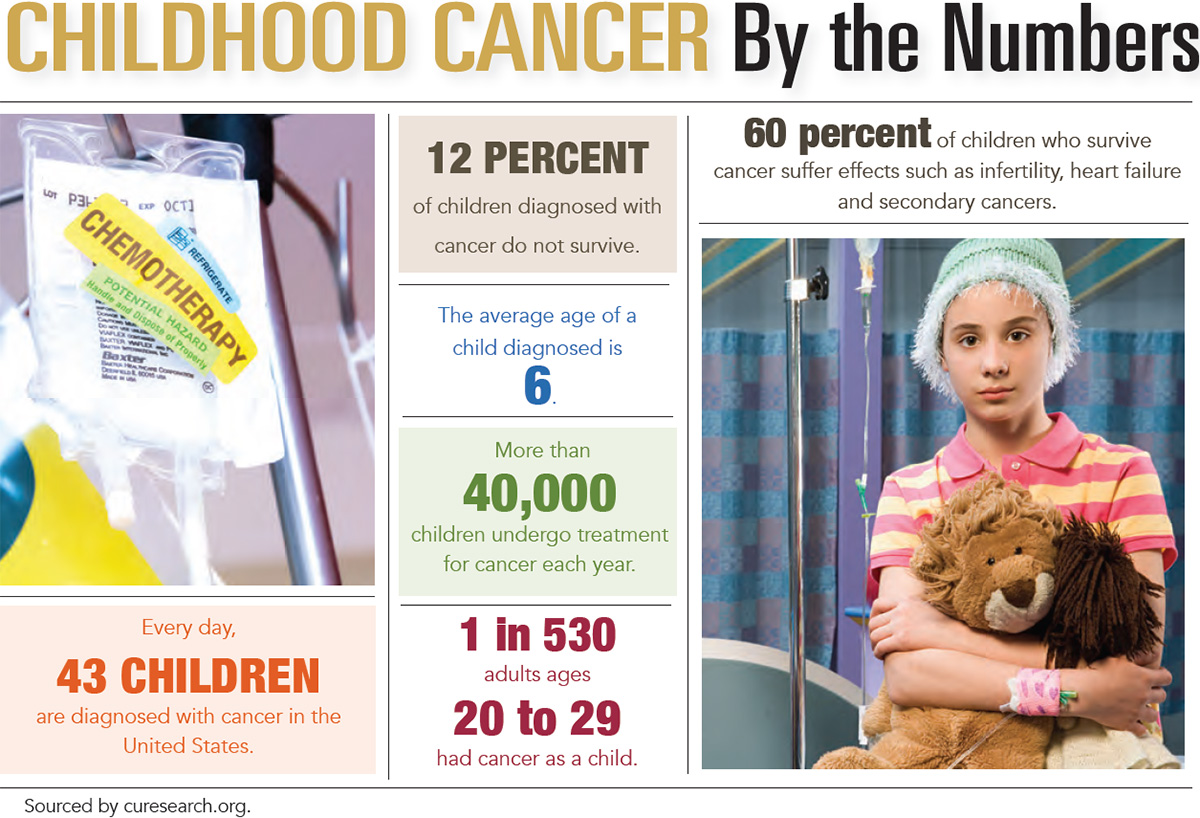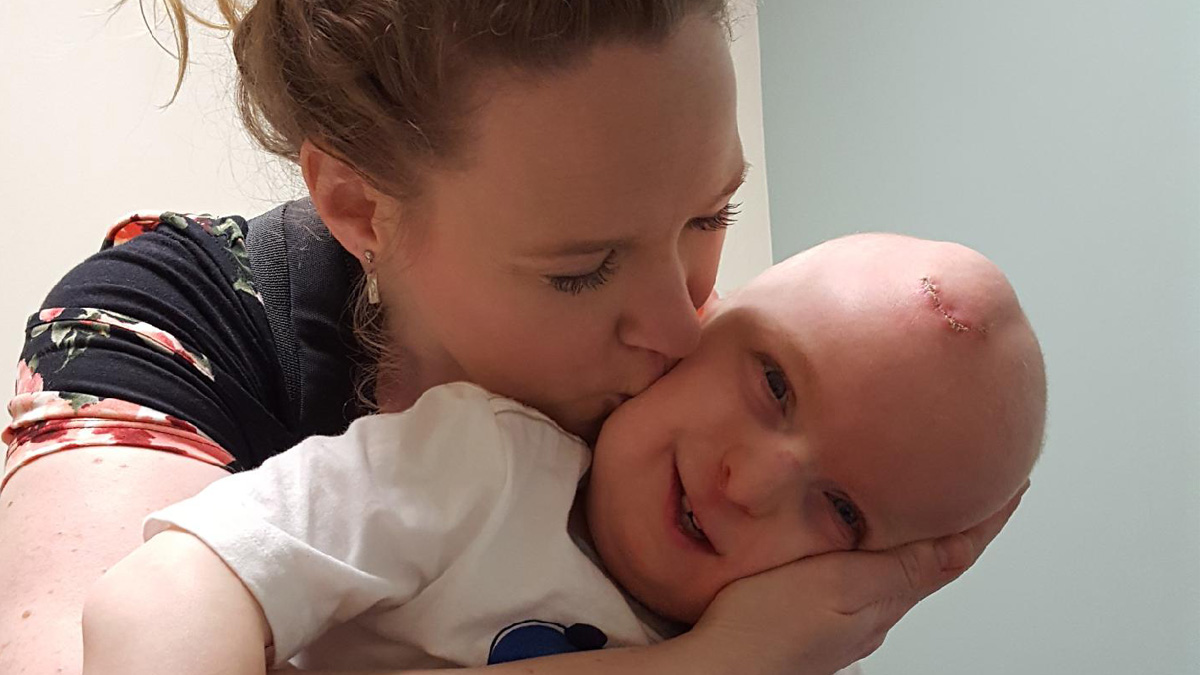The parents of Brian Glenney had been through a lot health-wise with their 4-year-old son. Since birth, he had dealt with Rubenstine-Taybi syndrome, a rare genetic condition that will necessitate surgeries and had delayed his development.
“We thought we had things pretty much under control in dealing with Rubenstine-Taybi, and then we were hit with something dreadful,” said his mother, Jessica.
When Brian was unable to move first his right arm and then his left and suffered excruciating pain, they knew something was seriously wrong. At first, doctors believed Brian had an infection, but the situation didn’t resolve itself and further tests were done. Finally, detailed bloodwork provided shocking news: Brian had acute lymphoblastic leukemia, commonly referred to as ALL.
The good news is that the youngster has been receiving treatment since February 2018 and is currently doing well. His mom has even joined the Children’s Hospital of Greenville Health System’s Family Advisory Council, where Brian has and is receiving treatment.
“We were devastated when we got the news,” said Jessica.
An initial infusion of chemotherapy was begun and the Glenneys, who live in Greenville, hoped for the best. After a month, Brian was better and most of the cancer was gone, but remnants remained, leaving the family with no other option than to begin a second round of chemotherapy using different drugs.
“We were told if the second round of chemotherapy didn’t completely eradicate the cancer cells, we might have to take Brian home on hospice,” said Jessica. “I don’t cry a lot, but I did off and on for days after that. I try to keep a hold on things, but I began thinking and planning for Brian’s funeral if it had to happen. I guess I didn’t want to be blindsided by having to deal with that worst case scenario.”
Well, there was no funeral and doctors reported to the Glenneys that the second round of chemo eradicated the cancer cells and that Brian was in remission. He still faces several years, perhaps up to three more, of chemotherapy, tests and careful monitoring of his health, because his immune system has been compromised by treatments. But Brian is home, being a little boy and being doted on by adoring and thankful parents and family.
“I had to quit my job as a CPA as a result of Brian’s cancer and actually that was such a blessing,” said Jessica. “I get to spend every day with him now and watch him grow and do things that I wouldn’t otherwise have had the chance to experience. I also write a Facebook blog called Baby Brian Beats Cancer as a way to help me deal with the situation and help other people.”
“No parent ever expects to hear the words, ‘your child has cancer,’” said Dr. Aniket Saha, a pediatric hematologist-oncologist at BI-LO Charities Children’s Cancer Center of Children’s Hospital of Greenville Health System. “So communicating that in an effective way is very challenging. Building trust from the onset is very important. Parents go through a million different emotions as I am telling them this unexpected and shocking news. I have to help them process it in a very short amount of time so that treatment can begin.”
What Dr. Saha strives to do is reassure the family that the child and family will be well cared for by an experienced multidisciplinary team and that they will get the best and most up-to-date treatment.
“I am able to pool together our entire team to help the family cope with the initial shock,” he said.
The Glenneys were told that Brian’s survival rate is 80 percent, which, although not the 90-plus percent survival rate if the first round of chemotherapy had worked, is still a whole lot better than the family’s worst fear when the second round commenced.
“I can’t say enough about the way we have been treated by the hospital staff,” said Jessica. “I don’t think there is a better group of people to act as Brian’s caretakers and medical team.”
The fight against childhood cancer continues unabated, but more needs to be done.
“In the past 50 years, tremendous progress has been made in the treatment of childhood cancer to where 80 percent of kids will be cured,” explained Dr. Saha.
He said one of the major advances in the past few years has been the advent of “immunotherapy”’ for various types of childhood cancer, including leukemia, Hodgkin’s lymphoma and neuroblastoma.
“In addition, amazingly, in some types of childhood cancer, the cure rates are so good that we are now trying to modify therapy to help reduce the short-term and long-term toxic effects of treatment, while maintaining excellent cure rates.”
He continued, “We still have a long way to go and more research is needed to help us accomplish these goals. Our clinic at the BI-LO Charities Children’s Cancer Center is the only place in Upstate South Carolina and one of three places in the state that are members of the Children’s Oncology Group, the largest childhood cancer research cooperative group in the world. Being part of this group allows us to offer children, adolescents and young adults the latest clinical trials and most up-to-date treatments. Trials are expensive, and our challenge is to encourage government and philanthropic funding necessary to support the continued improvement of cure rates in childhood cancer.”
Lisa Green, executive director of the Cancer Society of Greenville County and Cancer Association of Pickens County said, “Every day, we are seeing new drugs, new techniques, new research that are lifesaving and improve quality of life.”
But, she added, “More focus on rare cancers is imperative. One life lost is one too many. We need more childhood clinical trials and more focus on the effects of treatment and how children move on with their lives post cancer.”
What can individuals do if they want to help in the fight against childhood cancer? Green said, “Support local programs that are helping local children battling cancer and their families. Support research locally and nationally. Do your homework and research a charity before making a donation. You can always donate toys, gifts and experiences to area charities or children’s hospitals who work with local pediatric oncology patients.”
The battle is being won. Brian Glenney and so many other children are living proof. But one life lost to childhood cancer is, as Green and others on the front lines say, “one too many.”
By John Torsiello
Organizations that Help Support Childhood Cancer
Children’s Cancer Partners of the Carolinas
www.childrenscancerpartners.org
864-582-0673
Leukemia & Lymphoma Society
www.LLS.org
800-955-4572
American Cancer Society
www.cancer.org
800-227-2345
Cancer Society of Greenville County
www.cancersocietygc.org
864-232-8439
Ellis Mayfield Foundation
www.ellismayfieldfoundation.samsbiz.com
864-228-1620

